英汉语言比较之八:替换与重复
最新英汉对比研究-替换与重复精品文档

• 我们村过去有3000人口。旧社会里死的死,逃的逃。
• 哈利德放下烟斗,两手交叉着放在脖子后面,转过头去看窗子。
Halliday put his pipe down,crossed his hands behind his neck ,and turned his face towards the window.(“The Apple Tree”)
• 1)However, we actually learn a foreign language much faster than we do our mother tongue.
• 然而,事实上我们学习一门外语比学习母语快得多。 • 2)…in other words, you were studying the language all day long! You did this for
five years,… • 换句话说,你整天在学习语言,你这样学习已经五年了。 • 3)You should help him since you have promised to do so. • 你答应了要帮助他就应当帮助他
• 4)你晚上不想去电影院,我也不想去。 • You don`t want to go to the cinema tonight, neither do I. • 5)我喜欢读小说,他也喜欢读小说。 • I like reading novels, so does he. • 6)---狗正在抓门。 ---是的,总是抓门。 • ---The dog is scratching the door. ---Yes,he always does it /does that. • 7)---玛丽要去参加竞赛。---简也要参加竞赛。 • ---Mary will enter the competition. ---So will Joan . • 8)你要求我离开我就离开了。 • You ask me to leave , and so I did.
英译汉替换与重复
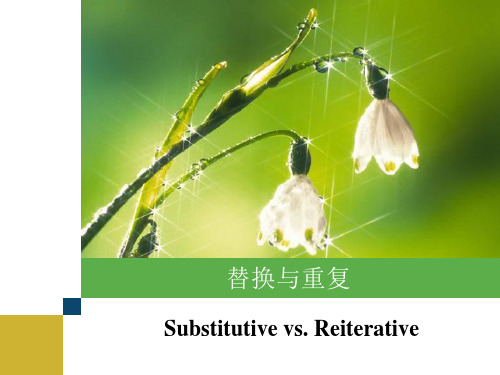
19
One cannot learn to produce a sound from an explanation only, or get a correct idea of a flavor from a description: a sound must be heard, a color seen, a flavor tasted, an odor inhaled. 人不能只从讲解中学会发音,也不能光靠描述而 体会某种滋味。声音必须耳闻,颜色必须眼见, 滋味必须口尝,气味必须吸入。
替换与重复
Substitutive vs. Reiterative
除非修辞的需要,英语一般要避免重复
Never use the same word or write the same thing twice in a sentence unless you are repeating intentionally for emphasis or for clarity.
7
汉语则通过重复强化行文的语气和修辞, 使语言生动有力。 英语宜采用替代、省略、变换等避免重复, 使行文简洁、有力,符合英语民族心理习 惯。
8
一、替代 1 名词性替代 英译汉不如英译法那么容易。 Translation from English into Chinese is not so easy as that from English into French.
11
3 分句性替代
中华民族从来就是一个伟大的勇敢的勤劳的民族, 只是在近代落伍了。这种落伍,完全是被外帝国 主义和本国反动政府所压迫和剥削的结果。 The Chinese have always been a great, courageous and industrious nation; it is only in modern times that they have fallen behind, which was due entirely to oppression and exploitation by foreign imperialism and domestic reactionary governments.
替换与重复的对比
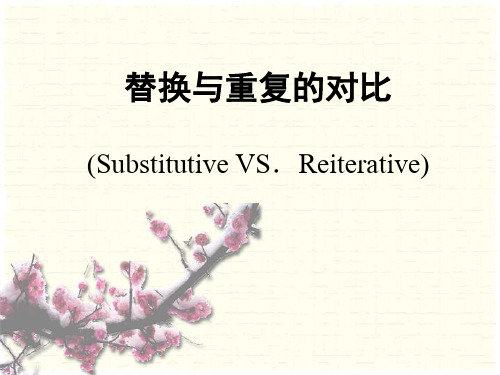
省略(omission)
• 省略和替代一样,也是避免重复的手段,语 言学称为“零位替代”(zero-substitution)。 英语常省略已经出现的词,而汉语则重复这 些词语。
阅读训练人的眼睛,说话训练人的口齿,写作训练 人的思维。 Reading exercises one’s eye’s; speaking, one’s tongue; while writing one’s mind. (F.Bacon)
你不愿意落后,她也不愿意落后。
You don’t want to lag behind. Neither does she.
The
Americans are reducing their defence expenditure this year. I wonder if the Russians will do so.
– 2)沉默啊!沉默啊!不在沉默中爆发,就在沉默 中灭亡。(鲁迅《呐喊》自序) Silence! Silence! Unless we burst out, we shall perish in this silence. – 3)We have to analyze and solve problems. 我们必须分析问题、解决问题。
一个人的工作,究竟是三分成绩七分错误,还是 七分成绩三分错误,必须有个根本的估价。 We must have a fundamental evaluation of a person’s work and establish whether his achievements amount to 30 percent and his mistakes to 70 percent, or vice versa.
汉英笔译基础教程第8章 重复与替换

8.3 句式的重复
❖ 部分保留 ❖ 秋天,无论在什么地方的秋天,总是好的;可
是啊,北国的秋,却特别地来得清,来得静, 来得悲凉。 ❖Autumn, wherever it is, always has something to recommend itself. In North China, however, it is particularly limpid, serene and melancholy.
8.1.2 舍弃叠音效果
❖ 成群成群的蝗虫毁灭了大片大片的稻田庄稼。 ❖Hordes of locusts ruined the crops in tracts of rice
field. ❖ 这是一条幽僻的路;白天也少人走,夜晚更加寂
寞。荷塘四面,长着许多树,蓊蓊郁郁的。
❖It is peaceful and secluded here, a place not frequented by pedestrians even in the daytime; now at night, it looks more solitary, in a lush, shady ambience of trees all around the pond.
8.3 句式的重复
❖ 融合法 ❖ 她底思想似乎浮漂在极远,可是她自己捉摸不
定远在那里。于是慢慢地跑回来,跑到眼前, 跑到她底孩子底身上。 ❖Lost in deep thought, she seemed absolutely dead to the reality surrounding her. Later she gradually came to, and found herself face to face with the present and her child.
英汉语对比 8 A comparison (1)
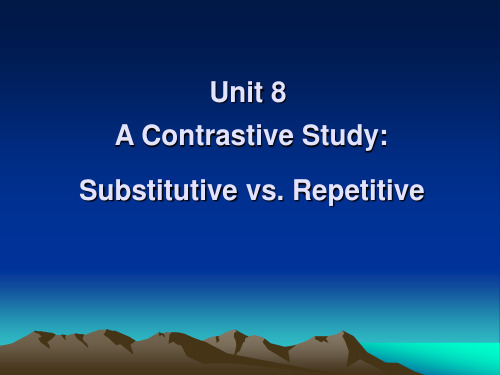
3. Variation (变换) 变换)
• English often uses synonyms or nearsynonyms (同义词、近义词 super 同义词、 同义词 近义词), ordinates (上义词 hyponyms (下义词 上义词), 下义词) 上义词 下义词 or general words (概括词 to avoid 概括词) 概括词 repetition, while Chinese usually repeats the same word (s). 1) John’s bought himself a new Ford. He practically lives in the car. • 约翰买了一部新福特,他几乎就住在这部 约翰买了一部新福特, 汽车里。 汽车里。
2. Ellipsis
• English usually leaves out the same word (s) from a sentence (zerosubstitution 零位替代 to avoid 零位替代) repetition, while Chinese often repeats the same word (s). 1) A man is called selfish, not for pursuing his own good, but for neglecting his neighbor’s. • 说一个人自私自利,并非因为他只图自己 说一个人自私自利, 的利益,而是因为他不顾他人的利益。 的利益,而是因为他不顾他人的利益。
2) An electron tube is generally used for amplification, and vacuum tube is another name for this device. • 电子管又称真空管,它通常用作放大物体。 电子管又称真空管,它通常用作放大物体。 3) The monkey’s most extraordinary accomplishment was learning to operate a tractor. By the age of nine, the monkey had learned to solo on the vehicle. (R. Quirk) • 这只猴子了不起的技能是学会驾驶拖拉机, 这只猴子了不起的技能是学会驾驶拖拉机, 它在九岁时已经学会单独表演驾驶拖拉机 了。
英汉对比研究(2)

英译汉时,这种“化虚为实”可以添文采,增加译文的可读性; 汉译英时,“化实为虚”可以化症结、消梗滞,提高转换的可译性。 他这一阵心头如同十五个吊桶打水,七上八下,老是宁静不下来。 His mind was in a turmoil these days and he was quite unable to think straight.
二、英语有丰富的词义虚化手段,也大大方便了抽象表达法的使用。
前缀:trans- 跨,multi- 多,retro-后,
ultra-超
后缀:-ity 表示性质、状态、程度。 calamity, purity, humanity, gravity -tion 表示动作、状态、结果。 occupation, decoration, internationalization, realization
Both we and the Chinese approached that first opening toward each other with caution, uncertainty, even trepidation. 我们和中国人双方都是怀着谨慎、不安甚至是惶恐的心情来互相探讨 这初次的接触的。 What they wanted most was an end of uncertainties. 那时他们最渴望的就是结束这摇摆不定的局面。
敬辞用来褒扬对方或与对方有关的人、事物或行为,以表示恭敬,如:
令尊 your father 尊夫人 your wife 惠顾 your patronage
奉告 Inform
光临 your presence 府上 your home 久违 I haven’t seen you for ages.
英汉语篇衔接手段中替换与重复的对比分析
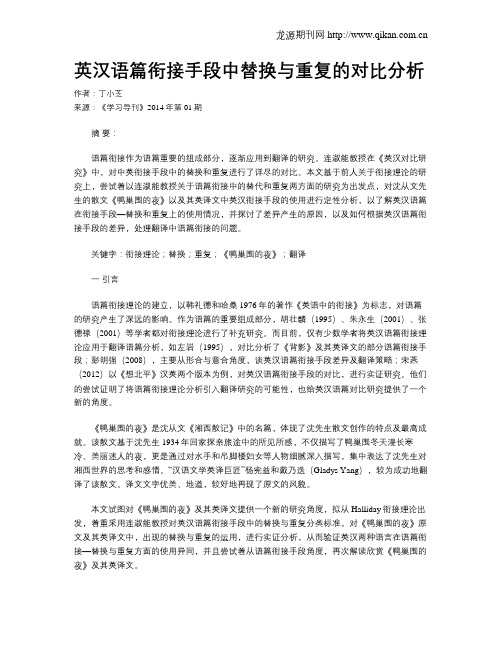
英汉语篇衔接手段中替换与重复的对比分析作者:丁小芝来源:《学习导刊》2014年第01期摘要:语篇衔接作为语篇重要的组成部分,逐渐应用到翻译的研究。
连淑能教授在《英汉对比研究》中,对中英衔接手段中的替换和重复进行了详尽的对比。
本文基于前人关于衔接理论的研究上,尝试着以连淑能教授关于语篇衔接中的替代和重复两方面的研究为出发点,对沈从文先生的散文《鸭巢围的夜》以及其英译文中英汉衔接手段的使用进行定性分析,以了解英汉语篇在衔接手段—替换和重复上的使用情况,并探讨了差异产生的原因,以及如何根据英汉语篇衔接手段的差异,处理翻译中语篇衔接的问题。
关键字:衔接理论;替换;重复;《鸭巢围的夜》;翻译一引言语篇衔接理论的建立,以韩礼德和哈桑1976年的著作《英语中的衔接》为标志,对语篇的研究产生了深远的影响。
作为语篇的重要组成部分,胡壮麟(1995)、朱永生(2001)、张德禄(2001)等学者都对衔接理论进行了补充研究。
而目前,仅有少数学者将英汉语篇衔接理论应用于翻译语篇分析,如左岩(1995),对比分析了《背影》及其英译文的部分语篇衔接手段;彭明强(2008),主要从形合与意合角度,谈英汉语篇衔接手段差异及翻译策略;宋燕(2012)以《想北平》汉英两个版本为例,对英汉语篇衔接手段的对比,进行实证研究。
他们的尝试证明了将语篇衔接理论分析引入翻译研究的可能性,也给英汉语篇对比研究提供了一个新的角度。
《鸭巢围的夜》是沈从文《湘西散记》中的名篇,体现了沈先生散文创作的特点及最高成就。
该散文基于沈先生1934年回家探亲旅途中的所见所感,不仅描写了鸭巢围冬天漫长寒冷、美丽迷人的夜,更是通过对水手和吊脚楼妇女等人物细腻深入描写,集中表达了沈先生对湘西世界的思考和感情。
“汉语文学英译巨匠”杨宪益和戴乃迭(Gladys Yang),较为成功地翻译了该散文。
译文文字优美、地道,较好地再现了原文的风貌。
本文试图对《鸭巢围的夜》及其英译文提供一个新的研究角度,拟从Halliday衔接理论出发,着重采用连淑能教授对英汉语篇衔接手段中的替换与重复分类标准,对《鸭巢围的夜》原文及其英译文中,出现的替换与重复的运用,进行实证分析,从而验证英汉两种语言在语篇衔接—替换与重复方面的使用异同,并且尝试着从语篇衔接手段角度,再次解读欣赏《鸭巢围的夜》及其英译文。
英汉语言比较之八:替换与重复

英汉语言比较系列之八综合语(synthetic)的特征是运用形态变化来表达语法关系,拉丁语、德语及古英语等都属于综合语。
分析语(analytic)的特征是不用形态变化而用词序及虚词来表达语法关系,汉语是典型的分析语。
现代英语是从古代英语发展出来的,仍然保留着综合语的某些特征,但是也具有分析语的特点:有形态变化,但不象典型的综合语那么复杂;词序笔汉语灵活,但相对固定;虚词很多,用得也相当频繁。
因此,现代英语属于综合-分析语(synthetic- analytic language)。
从语源(Etymology)观来说,英语属印欧语系(Indo-European Language),汉语则属汉藏语系(Sino-Tibetan language)。
八:替换与重复(Substitute vs. Reiterative)一般说来,除非有意强调或出于修辞的需要,英语总的倾向是尽量避免重复。
讲英语的人对于随意重复相同的音节、词语、句式或意义往往感到厌烦。
在能明确表达意思的前提下,英语尽量采用替代、省略或变换等方法来避免无意图的重复。
汉语则比较习惯于重复,因而常用实称、还原和复说的表达方法。
汉语的重复倾向与其语音文字的特点有密切的关系,汉语讲究均衡美的特点往往促成用词造句的重复倾向。
英语的代词在汉译时常常采用还原、复说或省略的办法加以处理。
41)He hated failure; he had conquered it all his life, risen above it, and despised it in others. 他讨厌失败,他一生中曾战胜失败,超越失败,并且藐视别人的失败。
42)You don’t want to lag behind.Neither does she.(替代)你不愿意落后,她也不愿意落后。
43)Reading ex ercises one’s eyes; speaking,one’s tongue; while writing, one’s mind.(省略)(F. Bacon)阅读训练人的眼睛,说话训练人的口齿,写作训练人的思维。
英译汉替换与重复

❖ 化学变化是改变粒子结构,形成新物质的一种变 化。
A chemical change is one in which the structure of particles is changed and a new substance is formed.
9
一定的文化是一定社会的政治和经济的反映,又给 予一定社会的政治和经济以巨大的作用和影响。
1
在英语中避免如下几种重复: ❖1 音节的重复 ❖Commercials seldom make for entertaining and
relaxing listening. Commercials seldom entertain and relax the listener.
2
❖Close examination of the results of the investigation led to a reorganization of the department.
10
2 动词性替代
❖ 美国人今年削减国防开支,我怀疑俄国人也会这 样。
❖The Americans are reducing their defense expenditure this year. I wonder if the Russians will do so.
7
❖汉语则通过重复强化行文的语气和修辞, 使语言生动有力。
❖英语宜采用替代、省略、变换等避免重复, 使行文简洁、有力,符合英语民族心理习 惯。
8
1 名词性替代
一、替代
❖ 英译汉不如英译法那么容易。
Translation from English into Chinese is not so
easy as that from English into French.
英汉语言对比替换与重复
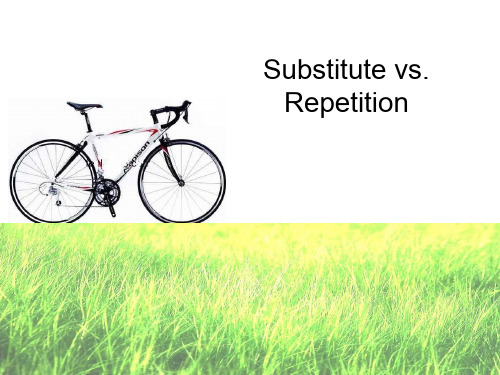
• More Examples: • advance planning • audible to the ear • assembled together • entirely complete • still remains
• foreign imports • repeat again • dash quickly • exactly identical • throughout the entire
• Substitution includes:
• 1.1 Nominal Substitution • 1.2 Verbal Substitution • 1.3 Clausal Substitution
• 1.1 Nominal Substitution
1) Personal Pronoun:he,she,it,they 2) Demonstrative Pronoun:this, that, these,
• 1)To use pronoun" so " or " not" to replace objective clause introduced by " that"
• 2)To use "if so" or "if not" to replace conditional clause
• 3)To use "as" to replace a part of sub-clause
•
It is an important principle of spoken
English and writing English to use pro-form to
替换与重复
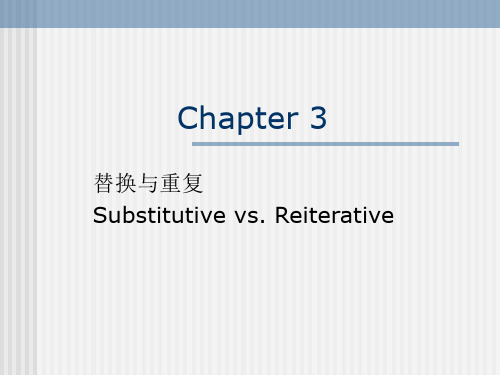
3 分句性替代
中华民族从来就是一个伟大的勇敢的勤劳 的民族,只是在近代落伍了。这种落伍, 完全是被外帝国主义和本国反动政府所压 迫和剥削的结果。 一个人的工作,究竟是三分成绩七分错误, 还是七分成绩三分错误,必须有个根本的 估价。
The Chinese have always been a great, courageous and industrious nation; it is only in modern times that they have fallen behind. And that was due entirely to oppression and exploitation by foreign imperialism and domestic reactionary governments. We must have a fundamental evaluation of a person’s work and establish whether his achievements amount to 30 percent and his mistakes to 70 percent, or vice versa.
3 句式重复
Now is the time for everyone to vote, for everything depends upon this election. All are against corruption, and so they should vote the Reform ticket. This is not a foolish thing, for the voters can elect anyone they want. But the people must turn out heavily, for if they do there is little doubt that they will elect the men they want.
英汉语言对比替换与重复

在翻译过程中,为了使译文更加清晰易懂,有时需要对原文中的语义进行重复,如将英语中的“I am a student”翻译为汉语中的“我是一个学生”。
在写作中的应用
词汇选择
在英语写作中,选择合适的词汇 进行替换和重复是提高语言表现 力的重要手段,如使用同义词或 反义词来丰富词汇表达。
句式变化
在英语写作中,通过改变句式结 构或使用不同的句型来替换和重 复,可以使文章更加生动有趣, 如使用排比句或对仗句。
对比分析英汉语言在替换与重复方面 的变化规律,揭示语言演变的共性和 特性,为语言政策和规划提供参考。
谢谢观看
非语言交际
在跨文化交际中,非语言交际也是重要的一环,通过肢体 语言、面部表情等非语言方式进行适当的替换与重复,可 以增强交际效果。
05
英汉语言替换与重复的 未来研究展望
替换与重复的认知机制研究
01
深入研究人类语言处理过程中替 换与重复的认知机制,探究其背 后的神经生理和心理过程。
02
对比分析英汉语言在替换与重复 方面的认知差异,揭示语言特性 和文化背景对认知过程的影响。
汉语词汇替换
汉语中也有类似的词汇替换现象,如“自行车”和“脚踏 车”,“手机”和“移动电话”。
汉语词汇重复
汉语中也有词汇重复的现象,如“好好学习,天天向上”, “他一直一直等待”。
语法层面的对比
英语语法替换
汉语语法替换
英语语法重复
汉语语法重复
英语中可以通过改变句子结构 或使用不同的时态、语态来表 达相同的意思,例如“I will go” 和“I am going”,“He has been working”和“He worked”。
汉语语义重复
英汉语言对比替换与重复

2)Repetition of Words
• Even to borrow money is wrong, according to Kant, because if everyone did borrow money, there would be no money left to borrow. • Even to borrow money is wrong, according to Kant, because if everyone did this, there would be no money left to borrow.
• 1.2 Verbal Substitution 1) Pro-verb:do 2) Composite Generation Verb: do so, do it, do that, do this, do the same 3) Substitute Sentence Structure: so+do+主语, so+主语+do, so+be+主语, so+主语+be, so+will+ 主语, so+主语+will
•
•
Substitution is a device for abbreviating and for avoiding repetition. In this second respect it is similiar to the use of lexical equivalents that are not identical repetition. Across sentences, substitution seems to be optional, and for stylistic reasons. Within sentences, it is sometimes obligatory. Most of the substitutes or Pro-Forms within sentences are also used across sentences.
替换与重复的对比

精选版课件ppt
24
– 2)沉默啊!沉默啊!不在沉默中爆发,就在沉默 中灭亡。(鲁迅《呐喊》自序) Silence! Silence! Unless we burst out, we shall perish in this silence.
– 3)We have to analyze and solve problems. 我们必须分析问题、解决问题。
精选版课件ppt
19
2)语法需要。如:
有缺点的战士终究是战士,完美的苍蝇也终究是苍 蝇。(鲁迅:《战士和苍蝇》)
我们一些旧衣服和旧家具,当的当了,卖的卖了。 (吴敬梓:《儒林外史》) Our old clothes and few sticks of furniture have been pawned or sold.
精选版课件ppt
11
省略(omission)
• 省略和替代一样,也是避免重复的手段,语 言学称为“零位替代”(zero-substitution)。 英语常省略已经出现的词,而汉语则重复这 些词语。
阅读训练人的眼睛,说话训练人的口齿,写作训练 人的思维。
Reading exercises one’s eye’s; speaking, one’s tongue; while writing one’s mind. (F.Bacon)
精选版课件ppt
25
• 3、翻译中隐性意义重复的处理
–1)桂林山水甲天下,在当时,我们哪有闲情逸致 去欣赏这画山秀水呢?(《忆杨朔(代序)》)
Guilin's beautiful mountains and rivers are worldfamous, but how could we enjoy its picturesque landscape in those years in a leisurely mood?
- 1、下载文档前请自行甄别文档内容的完整性,平台不提供额外的编辑、内容补充、找答案等附加服务。
- 2、"仅部分预览"的文档,不可在线预览部分如存在完整性等问题,可反馈申请退款(可完整预览的文档不适用该条件!)。
- 3、如文档侵犯您的权益,请联系客服反馈,我们会尽快为您处理(人工客服工作时间:9:00-18:30)。
英汉语言比较系列之八
综合语(synthetic)的特征是运用形态变化来表达语法关系,拉丁语、德语及古英语等都属于综合语。
分析语(analytic)的特征是不用形态变化而用词序及虚词来表达语法关系,汉语是典型的分析语。
现代英语是从古代英语发展出来的,仍然保留着综合语的某些特征,但是也具有分析语的特点:有形态变化,但不象典型的综合语那么复杂;词序笔汉语灵活,但相对固定;虚词很多,用得也相当频繁。
因此,现代英语属于综合-分析语(synthetic- analytic language)。
从语源(Etymology)观来说,英语属印欧语系(Indo-European Language),汉语则属汉藏语系(Sino-Tibetan language)。
八:替换与重复(Substitute vs. Reiterative)
一般说来,除非有意强调或出于修辞的需要,英语总的倾向是尽量避免重复。
讲英语的人对于随意重复相同的音节、词语、句式或意义往往感到厌烦。
在能明确表达意思的前提下,英语尽量采用替代、省略或变换等方法来避免无意图的重复。
汉语则比较习惯于重复,因而常用实称、还原和复说的表达方法。
汉语的重复倾向与其语音文字的特点有密切的关系,汉语讲究均衡美的特点往往促成用词造句的重复倾向。
英语的代词在汉译时常常采用还原、复说或省略的办法加以处理。
41)He hated failure; he had conquered it all his life, risen above it, and despised it in others. 他讨厌失败,他一生中曾战胜失败,超越失败,并且藐视别人的失败。
42)You don’t want to lag behind.Neither does she.(替代)
你不愿意落后,她也不愿意落后。
43)Reading ex ercises one’s eyes; speaking,one’s tongue; while writing, one’s mind.
(省略)(F. Bacon)
阅读训练人的眼睛,说话训练人的口齿,写作训练人的思维。
44)John has bought himself a new Ford. He practically lives in the car. (变换)约翰给自己买了一部新的福特汽车,他几乎就住在这部汽车里。
45)我为人人,人人为我。
(回环)One for all and all for one.
46)不懂就是不懂,不要装懂。
We must not pretend to know when we do not know.
47)物以类聚,人以群分。
Birds of feather flock together./ Like attracts like.。
